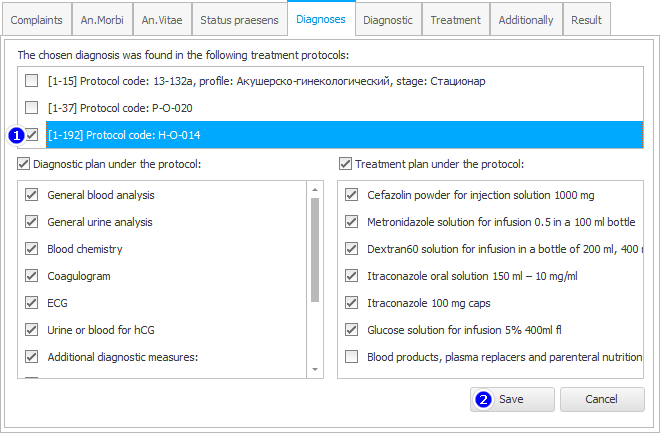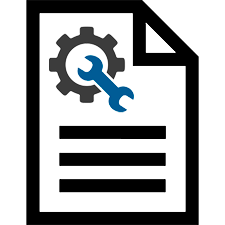

After pressing the ' Save ' button when selecting a diagnosis in the electronic medical history window, a form for working with treatment protocols may still appear. Protocols for the treatment of diseases is an approved plan for the examination and treatment of each type of disease.
Protocols for the treatment of diseases can be state, if they are approved by the state and must be observed by medical institutions operating in the territory of this country. Protocols can also be internal if a certain medical center has developed its own plan for examining and treating patients when certain diseases are detected.
Each treatment protocol has its own unique number or name. The protocols are divided into stages, which determine whether the protocol must be followed for outpatient or inpatient treatment. Also, the protocol may have a profile that indicates the medical department in a general hospital.

When a diagnosis is made, it is precisely those treatment protocols that include this diagnosis that appear. In this way, the ' USU ' smart program helps the doctor - it shows how a given patient should be examined and treated.

In the top list, where the treatment protocols themselves are listed, it is enough for the doctor to select any line to see the examination and treatment plan according to the selected protocol. Mandatory methods of examination and treatment are marked with a check mark; optional methods are not marked with a check mark.

When the doctor has decided on which treatment protocol to use, he can check the box next to the name of the desired protocol. Then click the ' Save ' button.

Only after that the previously selected diagnosis will appear in the list.


All "treatment protocols" are stored in a separate directory, which can be changed and supplemented if necessary. For example, here you can enter a new treatment protocol, which will need to be observed in your medical institution. Such a treatment protocol is called internal.

All treatment protocols are listed "at the top of the window". Each is assigned a unique number. Records are grouped "by profile" . Different treatment protocols are designed for different "stages of treatment" : some for the hospital, others for the outpatient reception. If the rules for treating a patient change over time, any protocol can be "archive" .
Each protocol deals with the treatment of only certain diagnoses, they can be listed at the bottom of the tab "Protocol diagnoses" .
On the next two tabs, it is possible to compose "protocol examination plan" And "protocol treatment plan" . Some records "mandatory for every patient" , they are marked with a special checkmark.

![]() See how to check if doctors are following treatment protocols .
See how to check if doctors are following treatment protocols .
See below for other helpful topics:
![]()
Universal Accounting System
2010 - 2025